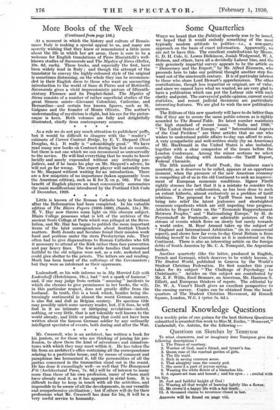Some Quarterlies
w.,w,..Nwe, heard Chat the Political-Quarterly was to be issued, we -hoped that it would embody something of the most typically modern attitude to politics—i.e., a non-party approach on the basis of exact information. Apparently, we are not to have this. The excellent contributions by Messrs. G. D. H. Cole, G. Lowes Dickinson, Josiah Wedgwood, W. A. Robson, and others, have all a decidedly Labour bias, and the only genuinely impartial survey appears to be the article on " Democracy and the Expert,' by Mr. Alfred Zimmern, -who proceeds here to take our political thought another step for- ward out of the nineteenth century. It is of particular interest to those who share Lord Hewart's apprehensions. The other contributions, though less impartial or original, are of value, and since we cannot have what we wanted, we are very glad to have a publication which can put the Labour side with such clarity and point. The surveys (of public opinion, current social statistics, and recent judicial decisions) are particularly interesting features. We are glad to wish the new publication success.
The Editors of this new quarterly will have to do better than this if they are to secure the same public esteem as is rightly accorded to The Round Table._ Its latest number maintains the_ high standard of recent issues. " India and 1980," " The United States of Europe," and " International Aspects of the Coal Problem " are three articles that no one who wishes to understand public affairs to-day can afford to miss. A very sympathetic and well-written study (by an American) of Mr. MacDonald in the United States is also included, together with a clear conspectus of the issues before the London Conference. Among the minor sections we select specially that dealing with Australia—the Tariff Report, Federal Chronicle.
The fifth number of World Trade, the business man's quarterly, as it deserves to be called, appears at an opportune moment, when the pressure of the new American economy is compelling all of us in the old Continent to seek an improve- ment of European economic conditions. Signor Pirelli rightly stresses the fact that it is a mistake to consider the problem of a closer collaboration, as has been done to such an extent hitherto, almost exclusively as a problem of tariff relations. The • proposal for a Tariff Truce was bound to bring into relief the latent jealousies and shortsighted economic expedients which are still impeding true progress. Articles by Roger Conte on the " Economic Rapprochement Between Peoples," and " Rationalizing Europe," by H. de Peyerimhoff de Fontenelle, are' admirable pointers of the stream of events which flows on slowly but surely towards a world order. M. Rene Arnaud takes up the subject of " England and International Arbitration " (in its commercial aspect), and shows how far even to-day. Great tritain is from binding herself to the Convention tui it is undeistood on the Continent. There is also an interesting article on the foreign debts of South America by Mr. C. A. Tornquist, the Argentine banker.
Another quarterly (like the latter,, produced in English, French and German), which deserves to be widely knowji, is The Student World, published in Geneva by the World's Student Christian Federation. Its first number this -year takes for, its subject- The Challenge of • Psychology to Christianity." Articles on this subject are contributed by Mr. Z. F. Willis, Emil Brunner, an American, Mr. Harrison S. Elliott, and European thinkers of repute. The editorial by Dr. W. A. Visser't Hooft gives an excellent perspective• to the-ensuing survey. •Copies can "-be obtained from the head- quarters of The Student Christian Movement, 82 Russell Square, London, W.C. 1 (price 3s. 6d.). •






































 Previous page
Previous page